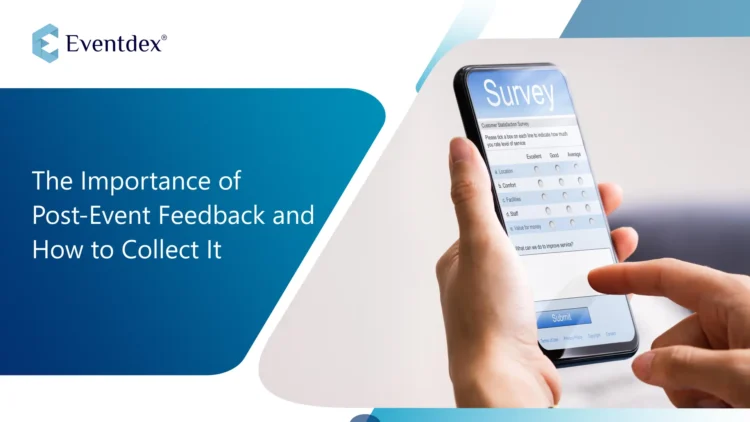The Importance of Post-Event Feedback and How to Collect It
Post-event feedback plays a crucial role in shaping how future events are designed, delivered, and remembered by attendees. After all the planning, coordination, and long hours that go into organizing an event, it is easy to move on once everything wraps up. But the real insight often comes after the final session ends and the crowd reaches home. What did attendees really think? What moments stood out? Where did things fall short? This is where post-event feedback becomes incredibly valuable. It offers a window into the attendee experience from their perspective, not just the organizer’s. It highlights what worked well and what needs improvement, helping you make informed decisions for your next event.
Besides, it is a meaningful step toward building stronger relationships with your audience and creating better experiences over time. Collecting feedback shows that you care about more than just attendance numbers. It shows that you are listening. When done thoughtfully, this event feedback becomes one of your most powerful tools for growth, innovation, and long-term success in the event space.
Why Post-Event Feedback Matters
The importance of post-event feedback goes far beyond collecting a few star ratings or brief compliments. It’s not just about wrapping up the events but unlocking the full value of what just happened. Feedback is your event’s echo. It’s what lingers in the minds of attendees, partners, and sponsors. And it’s the clearest lens through which you can view your successor spot what needs fixing.
More than data, post-event feedback is a story. A story told by the people who experienced your event firsthand. When collected and interpreted thoughtfully, this feedback becomes the backbone of better decisions, smarter planning, and more meaningful engagement. Let us now explore why it matters so much:
1. Improvement with Precision and Purpose
You might feel that your event went smoothly, but assumptions are not insights. Post-event feedback gives you the clarity to move from guessing to knowing.
Perhaps attendees loved the content but hated the breakout session logistics. Or maybe your headline speaker didn’t land as well as expected. Without feedback, you’re left with blind spots. With it, you gain actionable direction.
This level of insight allows you to focus your energy where it’s most needed, refining registration flows, improving session timing, fixing venue issues, or enhancing digital experiences. It’s not just about fixing mistakes; it’s about continual fine-tuning to deliver something better every time.
2. Unlocking Engagement Metrics Post-Event
Metrics like app usage, session attendance, or booth traffic provide raw data, but they don’t always tell you why something happened. That’s where post-event feedback completes the picture.
For example, say a breakout session had unusually low turnout. Your data shows the numbers, but feedback reveals the reason: unclear labeling in the agenda or a topic that felt irrelevant. Or maybe your most-attended session got lower ratings than expected; feedback might reveal the speaker didn’t engage well, or the room was too crowded. By pairing engagement metrics with qualitative feedback, you move beyond surface-level insights into meaningful analysis.
3. Audience-Centric Planning for Future Events
These days, attendees expect experiences tailored to their needs. And the best way to design those experiences? Ask them. Post-event feedback empowers you to co-create your future events with your attendees. When you ask what worked, what didn’t, and what they’d like to see next time, you’re not just collecting opinions, you’re gathering direction. This approach ensures that every new event is a step closer to what your audience truly values.
Moreover, involving attendees in your planning process builds a sense of ownership. People are far more likely to attend again if they feel like their feedback shaped what’s coming next.
4. Justifying and Increasing Sponsorship Value
Sponsors want visibility, engagement, and measurable ROI. You can provide that with robust post-event feedback.
From feedback on booth engagement to session ratings of sponsor-hosted content, sponsors get a clear picture of how their presence was perceived. When feedback indicates that their efforts resonated with attendees, it becomes powerful proof of value, helping you retain current sponsors and attract new ones.
On the other side, if feedback shows missed opportunities or low engagement, you can adjust sponsorship packages or placements proactively. It builds trust and shows sponsors that you’re invested in improving their experience too.
5. Fostering Trust and Driving Retention
When attendees take the time to share their opinions and see their voices reflected in future changes, it does something incredibly powerful as it builds trust. A well-designed post-event feedback survey, followed by visible action, shows people that you’re not just checking a box but you’re listening. This sense of being valued often translates into repeat attendance, increased word-of-mouth referrals, and stronger loyalty. It also helps your community feel more connected to your event brand, which is critical in a saturated event space.
How to Collect Post-Event Feedback
Understanding how to collect post-event feedback effectively is critical to measuring the success of your event and improving future experiences. While sending a simple form might seem like the easiest way, relying on a standard approach often leads to low engagement and surface-level insights. A thoughtful strategy involves combining several event feedback collection methods that are tailored to your audience, event type, and communication channels.
When done correctly, a multi-channel, well-timed approach will significantly increase your response rates and the quality of the insights you gather. Below are the most impactful strategies for collecting valuable post-event feedback that informs and empowers your planning team.
1. Post Event Feedback Survey
A carefully designed post-event feedback survey is still one of the most reliable and widely used tools. It allows organizers to gather structured feedback from attendees through a variety of question types. A successful survey should include a mix of open-ended post-event questions, rating scale event feedback, and multiple-choice post-event questions to provide both measurable data and thoughtful commentary.
To ensure meaningful responses, it’s essential to tailor your post-event survey questions to the specific nature of the event. Surveys should be concise, intuitive, and aligned with the event’s goals and expected outcomes. They should be designed differently for post-event feedback for conferences, webinars, or trade shows, depending on what insights are most valuable in each context. Clarity in structure, brevity in design, and relevance in content all contribute to the success of a post-event feedback survey.
2. Live Feedback Polling Tools
Integrating live feedback polling tools during your event adds a dynamic layer to your data collection process. These tools enable you to capture impressions and responses in real time, enhancing the overall feedback experience while the event is still ongoing. Attendees tend to respond more authentically when prompted at the moment, and real-time data can reveal immediate insights into engagement and satisfaction.
This method is not only effective for boosting participation but also for enhancing the accuracy of the feedback. When attendees share their opinions while still immersed in the experience, the responses tend to be more specific, detailed, and emotionally driven. Incorporating live polling as part of your strategy can also stimulate greater interest in post-event participation, as it builds a sense of involvement throughout the experience.
Real-time polling data is also easier to act upon quickly, helping teams make necessary adjustments for the remainder of the event or begin planning changes for future editions.
3. Event App Surveys for Feedback
Using event app surveys for feedback provides an integrated and user-friendly method for collecting opinions directly from attendees while they’re actively engaging with your event platform. Most modern event apps offer built-in survey tools that can be triggered at specific touchpoints, such as the end of a session or after a networking activity.
This method ensures that post-event feedback is captured with minimal disruption to the attendee’s journey. By embedding the feedback mechanism into the app interface, you reduce barriers to entry and make it more convenient for users to respond. Push notifications can be used strategically to prompt feedback, ensuring that the request doesn’t go unnoticed.
What makes app-based feedback especially valuable is its timeliness. Since attendees are already using the app for navigation, scheduling, or communication, the transition to sharing feedback becomes seamless. Additionally, app-collected feedback is often more segmented, allowing you to analyze responses by session, track, or attendee profile for more nuanced post-event data analysis.
4. Post-Event Questionnaire Embedded in Emails
Embedding a post-event questionnaire directly into follow-up emails is a streamlined and highly effective way to collect feedback from attendees. This method works particularly well when using a structured and visually clean post-event feedback email template. Instead of redirecting users to an external form, the survey lives within the email itself, reducing friction and increasing response rates.
This format works best when paired with a clear message that communicates the importance of post event feedback and how it will be used. The tone should be appreciative and participant-centric, emphasizing that the insights provided will contribute to the ongoing improvement of future events. Additionally, this method can be fully automated, making it scalable for large events while maintaining personalization.
Timing is essential here. Sending the email within 24 hours ensures the event is still fresh in attendees’ minds. Incorporating a post event survey reminder email a few days later can help capture feedback from those who missed the first message. You can also schedule a final post event thank you survey for late respondents or key audience segments such as sponsors and speakers.
Creating a Multi-Touch Feedback Strategy
Rather than relying on a single approach, combining multiple event feedback collection methods helps cover different attendee preferences and boosts response quality. Not every attendee will respond to the same channel, and offering several options ensures inclusivity and increased participation.
For instance, live feedback polling tools can be used during the event to gauge immediate reactions. After the event, you can send out a detailed post-event feedback survey via email, followed by event app surveys for feedback during key engagement touchpoints. Including a post-event questionnaire in your follow-up emails ensures that attendees who might have overlooked in-app surveys still have a chance to share their input.
This multi-channel approach also benefits your internal analytics. By gathering responses from various sources and formats, you obtain a more well-rounded dataset. It allows for deeper post event data analysis, letting you break down responses by time, channel, and type of respondent. This granularity is essential when measuring your engagement metrics post-event and preparing detailed reports using post-event feedback reporting tools.
Aligning Collection Methods with Event Types
Different event types require slightly different tactics when it comes to collecting post-event feedback. For physical events such as exhibitions or large-scale conferences, on-site kiosks and app-based surveys may be more effective. In contrast, virtual event feedback surveys benefit from immediate in-platform feedback forms and email surveys sent out minutes after the session ends.
Hybrid event feedback surveys require extra coordination, as the expectations of in-person and virtual attendees often differ. In such cases, it’s critical to customize your questions and collection channels for each group to ensure accurate and relevant data.
Regardless of the format, the goal remains the same: gather honest, actionable insights that can inform everything from content programming and venue selection to sponsor value and technical execution.
Incentivizing Feedback the Smart Way
Most attendees walk away from an event feeling one of two things: satisfied or indifferent. But regardless of their experience, very few immediately rush to fill out a post-event feedback survey. Not because they don’t care, but because they’re busy. Life picks up, the event becomes a memory, and your carefully crafted questions quietly sit in their inbox, unopened.
This is why incentives matter. Not as a bribe, but as a simple, thoughtful thank you. A way to acknowledge their time and effort. When feedback is rewarded genuinely, it often encourages people to share more openly, honestly, and thoroughly.
Aligning your post-event feedback incentives strategies with your audience, event tone, and format can lead to a significant boost in responses. It also shows your attendees that their voices matter and that you’re willing to offer something in return for their input.
Gift Cards
Gift cards have universal appeal. A modest denomination, say, $10 to a coffee shop or online retailer, can make the feedback experience feel rewarding and appreciated. This type of incentive works especially well for virtual event feedback surveys, where attendees participate from home and value something simple and direct. It also eliminates the need to mail physical items, keeping logistics smooth and scalable.
Discounted Tickets for Future Events
For events that are part of a series, such as annual conferences or ongoing webinars, offering discounted or early-access tickets can be an excellent incentive. It encourages both feedback and loyalty. Attendees are more likely to engage when they feel they’re part of a growing experience, not just a one-time session. This approach works especially well when collecting post-event feedback for conferences, summits, and trade shows.
Exclusive Content
Content holds value, especially when it’s not accessible anywhere else. Rewarding attendees with exclusive access to behind-the-scenes sessions, extended speaker interviews, downloadable resources, or premium session recordings can feel like a bonus gift. This strategy works particularly well when attendees are highly engaged and would likely want to revisit or explore additional material. It turns a post-event questionnaire into the gateway for continued value.
Donations to Charity
Some audiences are motivated by purpose more than personal gain. Offering to donate a small amount, say, $5, for every completed post-event feedback survey can inspire action in a way that’s more meaningful. This incentive shows that the feedback doesn’t just serve the organizer, but contributes to something larger. It can work particularly well for community-focused, nonprofit, or mission-driven events.
Public Recognition
Recognition can often mean more than any physical reward. Quoting attendees in your wrap-up email, mentioning top feedback in your event summary, or spotlighting thoughtful suggestions on your social media channels gives participants a sense of ownership in your event’s future. This is a powerful way to build ongoing loyalty. Incorporating public recognition into your post event follow up questions strategy can also encourage richer, more candid responses.
Matching the Right Incentive to the Right Audience
The best post event feedback incentives strategies are the ones that feel tailored. Think about your attendees, what they value, what motivates them, and how they prefer to engage.
For a tech-savvy crowd, early access to new tools or beta platforms might hold more weight than a generic gift card. For educators, a certificate or professional development badge may be appreciated. For creative professionals, exclusive content or digital swag can make a lasting impression. Understanding your audience helps you frame your post event survey questions and incentives with intention rather than assumption.
Communicating the Incentive Effectively
Once you choose an incentive, don’t bury it at the bottom of an email. Make it clear, upfront, and easy to understand. A sentence or two is often enough:
“Complete our short survey and receive a $10 coffee voucher, our way of saying thank you,” or “We’re donating $5 to charity for blinds for every response. Share your thoughts and help us give back.”
The tone should feel natural and sincere. The reward should feel like a token of appreciation, not a trick. Besides, it’s also important to follow through. If the incentive is promised, deliver it promptly. Delays or inconsistencies can damage trust and reduce participation in future surveys.
Wrapping Up
Post-event feedback is the mirror that reflects your event’s true value, not just in terms of logistics or attendance, but in the emotional resonance, experience quality, and lasting impact on your audience. It helps you understand the why behind attendee behavior, the what behind success metrics, and the how behind continuous improvement.
From thoughtfully crafting a post-event questionnaire that captures nuanced sentiment, to leveraging cutting-edge post event feedback tools that simplify data collection and visualization, every single step in your feedback strategy has the potential to elevate your next event far beyond expectations.
Are you all set to upgrade your post-event feedback strategy? With Eventdex’s all-in-one event management software, you gain access to powerful built-in tools designed to streamline and enhance your feedback process. From intuitive event app surveys for feedback to robust post-event feedback reporting tools, Eventdex empowers you to collect meaningful data effortlessly. So why wait? Book your free demo with Eventdex today, where every voice shapes your success.


















